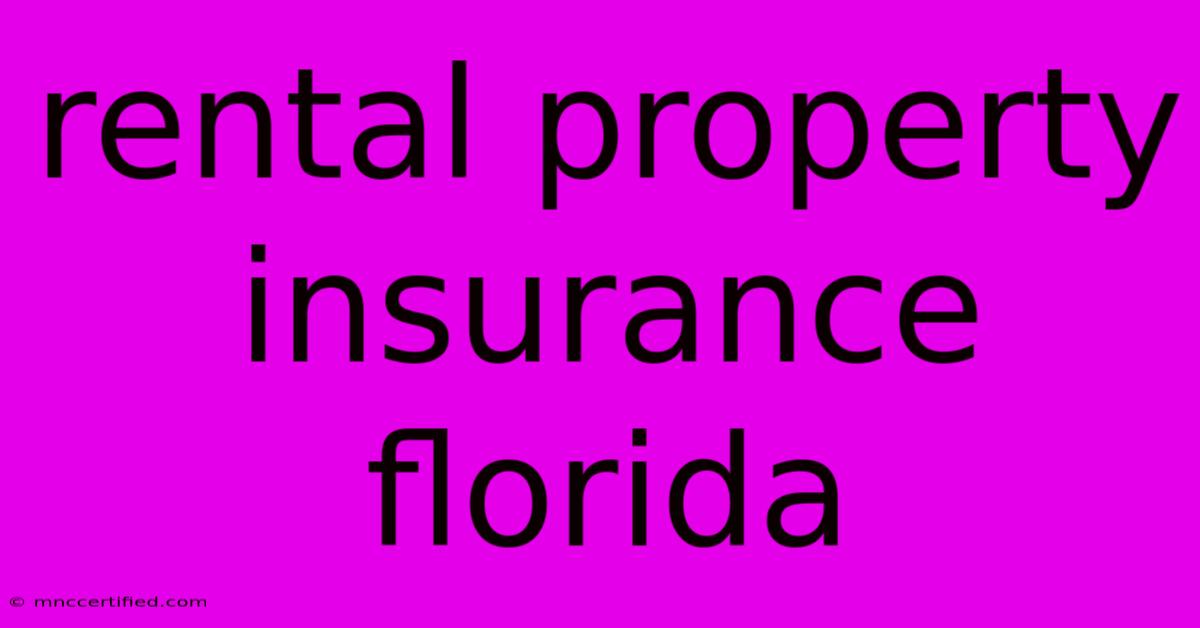Rental Property Insurance Florida

Table of Contents
Navigating the World of Rental Property Insurance in Florida
Florida's vibrant real estate market makes rental properties a lucrative investment. However, owning rental properties in the Sunshine State comes with unique challenges, especially concerning insurance. Understanding the intricacies of rental property insurance in Florida is crucial for protecting your investment and avoiding costly mistakes. This comprehensive guide will equip you with the knowledge to choose the right coverage and secure your financial future.
Why is Rental Property Insurance in Florida Essential?
Florida's susceptibility to hurricanes, severe weather, and even sinkholes makes comprehensive insurance a non-negotiable for rental property owners. Standard homeowner's insurance won't suffice; you need a policy specifically designed for rental properties. This type of insurance protects you from a range of potential losses, including:
- Property Damage: Hurricanes, fires, windstorms, and other perils can cause significant damage to your rental property. Florida rental property insurance protects your investment by covering repairs or rebuilding costs.
- Liability: Accidents can happen. If a tenant or guest is injured on your property, you could face a lawsuit. Liability coverage protects you from financial ruin in such scenarios.
- Loss of Rental Income: If your property becomes uninhabitable due to damage, you'll lose rental income. Rental property insurance in Florida often includes coverage for lost rental income until repairs are complete.
- Tenant Liability: While your policy covers you for tenant-related accidents, ensuring your tenants have renters insurance offers another layer of protection.
Understanding the Differences: Homeowners vs. Landlord Insurance
Many confuse homeowner's insurance with landlord insurance. The crucial difference lies in the coverage provided. Homeowner's insurance protects owner-occupied properties, while landlord insurance, also known as rental property insurance, specifically covers properties rented to tenants. Landlord insurance typically includes:
- Building Coverage: Protects the structure of the property.
- Liability Coverage: Protects you from lawsuits related to accidents on the property.
- Loss of Rents Coverage: Covers lost income due to property damage.
- Personal Property Coverage (Optional): Covers your personal belongings stored on the property. Note that this is usually separate from tenant's belongings.
Key Factors to Consider When Choosing Rental Property Insurance in Florida
Choosing the right Florida rental property insurance policy requires careful consideration of several key factors:
- Coverage Limits: Determine appropriate coverage limits for your property's replacement cost and liability. Underinsuring can leave you financially vulnerable.
- Deductibles: Higher deductibles lower your premiums but require a larger out-of-pocket expense in case of a claim. Consider your financial capacity when selecting a deductible.
- Flood Insurance: Florida is highly prone to flooding. Flood insurance is not typically included in standard rental property insurance and must be purchased separately through the National Flood Insurance Program (NFIP) or a private insurer. This is a critical component of your overall risk management strategy.
- Hurricane Deductibles: Many insurers offer different deductible options specifically for hurricane damage. Understand these options thoroughly.
- Insurer Reputation: Research different insurance companies and compare their claims handling processes, customer service ratings, and financial stability. Look for reviews and ratings from reputable sources.
- Additional Coverage Options: Consider optional endorsements, such as coverage for specific perils like sinkholes or personal property of the landlord stored on the premises.
Finding the Right Insurance Provider for Your Florida Rental Property
Shopping for rental property insurance in Florida requires careful comparison. Use online comparison tools to get quotes from multiple insurers. Don't solely focus on the cheapest option; consider the breadth and quality of coverage offered. Contact multiple insurance agents directly to discuss your specific needs and obtain personalized recommendations.
Preventing Claims and Maintaining Your Insurance Coverage
Proactive measures can significantly reduce the likelihood of insurance claims and maintain the validity of your policy.
- Regular Property Maintenance: Keeping your property well-maintained reduces the risk of damage and claims. Address any repairs promptly.
- Tenant Screening: Thorough tenant screening helps reduce the risk of tenant-related damage or liability issues.
- Proper Documentation: Maintain detailed records of all property repairs, maintenance, and tenant interactions. This can be crucial if you need to file a claim.
- Accurate Property Valuation: Ensure your property is accurately valued to avoid underinsurance. Regular appraisals are recommended.
Conclusion: Protecting Your Florida Rental Investment
Owning rental properties in Florida presents both opportunities and risks. By understanding the nuances of rental property insurance in Florida and selecting the appropriate coverage, you can safeguard your investment and navigate the potential challenges with confidence. Remember to regularly review your policy to ensure it remains suitable for your needs. Investing in comprehensive insurance is not just an expense; it's a crucial element of responsible property ownership in the Sunshine State.

Thank you for visiting our website wich cover about Rental Property Insurance Florida. We hope the information provided has been useful to you. Feel free to contact us if you have any questions or need further assistance. See you next time and dont miss to bookmark.
Featured Posts
-
Russia North Korea Alliance Implications
Nov 19, 2024
-
Live Stream Poland Vs Scotland Uk
Nov 19, 2024
-
Australia Wins Third T20 Against Pakistan
Nov 19, 2024
-
Insurance Agents In Pittsburgh Pa
Nov 19, 2024
-
Security First Insurance Flint Mi
Nov 19, 2024